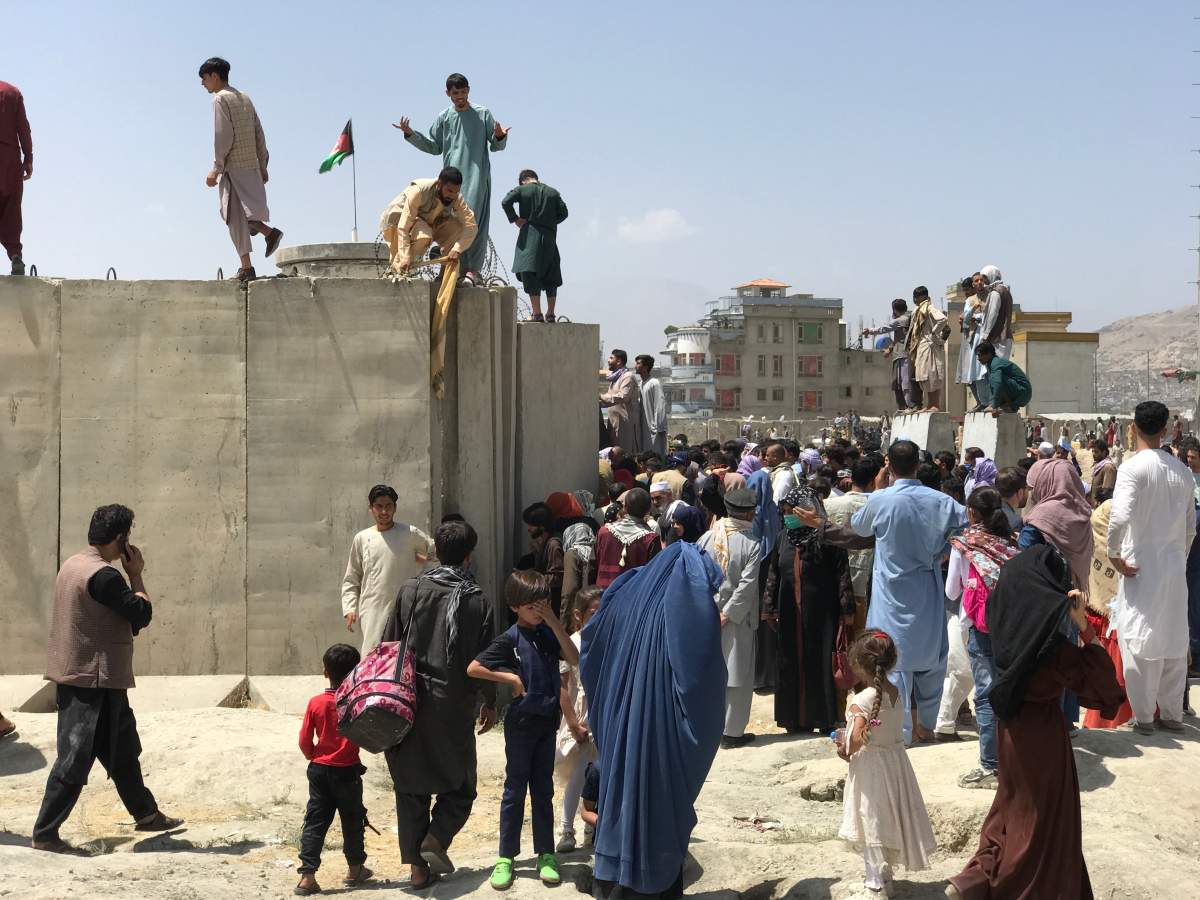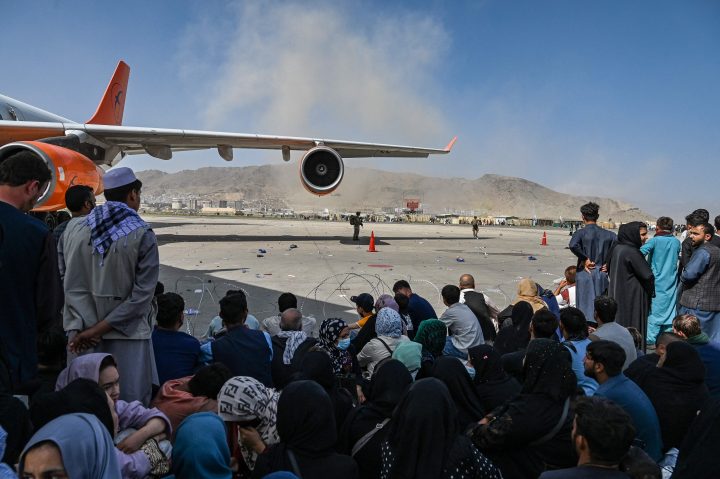The Taliban have taken back control of Afghanistan, forcing thousands to flock to the country’s international airport in an attempt to flee a country in chaos.

The Islamist organization, which was ousted from leadership when the War on Terror began following the Sept. 11, 2001 attacks, swiftly returned to power following a two-decades long war led by the United States. The U.S. is set to withdraw its last remaining troops by the end of the month.
The insurgents have stormed across the country, capturing all major cities, including the nation’s capital in Kabul, in a matter of days as Afghan security forces trained and equipped by the U.S. and its allies dissolved and fled.
So how did this happen, and what will happen next?
Why did Afghanistan fall to the Taliban?
Even though the Taliban were forced from power in 2001, the militant group never left. With the U.S. and NATO’s pending military departure from the region, the Taliban began making a resurgence to take back power. Last week though, the group blitzed the country, taking swaths of Afghanistan in days and forcing the Western-backed government to flee.
Why did they flee? The U.S. and its NATO allies spent billions of dollars over two decades to train and equip Afghan security forces. But the government was rife with corruption; commanders exaggerated the number of soldiers to siphon off resources, and troops in the field often lacked ammunition, supplies, or even food.
Their will to fight waded further too when it became clear the U.S. was leaving the country, said Aurel Braun, professor of international relations and political science at the University of Toronto.
“It’s a catastrophe for the Afghan people — they have been abandoned,” he told Global News.
“The Taliban have shown themselves to be basically governed by notions of medieval brutality. They do not tolerate dissent, they do not tolerate any kind of opposition and the people of Afghanistan have reason to be utterly fearful.”
The country’s president, Ashraf Ghani, also fled the country as the Taliban closed in on Kabul. It’s not clear where he went.
What is happening in Afghanistan right now?
With the Taliban seizing Kabul and taking back power, thousands of Afghans are trying to get out of the country for their safety.

Get daily National news
Many fear the Taliban will reimpose the harsh interpretation of Islamic law they had when they controlled Afghanistan from 1996 to 2001.
During those times, women were barred from attending school or working outside the home, and they had to wear the all-encompassing burqa and be accompanied by a male relative whenever they went outside. The Taliban also banned music, cut off the hands of thieves and stoned adulterers.

The Taliban have tried to present themselves as a more moderate group since the democratic government offered more liberty during their reign, though many Afghans are skeptical of those promises.
Thousands have flocked to Kabul’s international airport where U.S. security forces are trying to control airspace.
Some people are so desperate to escape that they held onto an American military jet as it took off and fell as it went airborne. Images coming out of the country show many civilians waiting at the airport, with some seen climbing the boundary wall of Hamid Karzai International Airport.
At least seven people have died, U.S. officials said.
How is Canada and the world helping Afghanistan right now?
Several countries, including Canada, are working to get their diplomats and Afghans who helped their forces during the war out of the country.
The government won’t disclose how many Canadians are still stuck on the ground in Afghanistan, citing security reasons.
Canada has expanded its humanitarian efforts to help resettle thousands of Afghan refugees. About 20,000 Afghans who have already left the country will be resettled by Canada’s newly expanded program.

During a campaign stop Monday, Liberal Leader Justin Trudeau told reporters Canada is working with its allies to get more Afghans out of the country.
“We have evacuated the Canadian diplomatic staff. There remains a number of special forces and Canadian armed forces on the ground to help secure the airport alongside the Americans,” he said.
“The processing is being done remotely of Afghan nationals; there also remain a number of Canadian citizens and dual Canadian Afghan citizens on the ground, who we are working closely with and tracking as much as is possible in the chaos right now and very much prioritizing the evacuation of them if it is possible, which as I said, are working very closely with our allies on.”
On Monday, United Nations Secretary-General Antonio Guterres called on the U.N. Security Council to “use all tools at its disposal to suppress the global terrorist threat in Afghanistan” and guarantee that basic human rights will be respected.
“We are receiving chilling reports of severe restrictions on human rights throughout the country. I am particularly concerned by accounts of mounting human rights violations against the women and girls of Afghanistan,” he told the 15-member council.
“We cannot and must not abandon the people of Afghanistan,” he said.
Braun agrees.
“We need to understand that this is both a domestic issue in Afghanistan … (and) that this is a danger to the whole international system,” he said.
“So we can’t just avert our eyes, we have no choice but to be engaged. So the question is, do we engage in a productive, effective way? Or do we just get dragged into it later on in a reactive way?”
Afghanistan’s U.N. ambassador Ghulam Isaczai told the Security Council he was speaking for millions of people “whose fate hangs in the balance,” including women and girls “about to lose their freedom to go to school, to work and to participate in the political, economic, and social life of the country.”
Isaczai called on the council and the United Nations not to recognize any administration that achieves power by force or any government that is not inclusive. He urged them to call for the immediate establishment of an inclusive transitional government.
What happens next?
It’s not clear what will happen now in Afghanistan, but the Taliban claim they want to form an “inclusive, Islamic government” with other factions.
They have pledged to enforce Islamic law but say they will provide a secure environment for the return of normal life after decades of war.

Braun doubts that will happen, and says that even though Canada is a “minor player” compared to the United States and other countries, it must put pressure on the Taliban regime and its supporters.
“We need to make it very clear that this Taliban emirate will be isolated internationally, and that they will not get a chance to spread terrorism around the world,” he said.
“We need to cooperate with other democracies, with countries in the region, to contain this brutal force; and we need to engage in as much rescue as we can … because we’re likely to see the Taliban attack, torture and possibly kill anyone who had any association with Western forces, Canadian or otherwise.”
— with files from The Associated Press and Reuters
- Canadians say U.S. no longer an ally, is bigger threat than Russia: poll
- Virginia Giuffre’s family responds to Andrew arrest: ‘He was never a prince’
- Trump accuses Obama of releasing classified info on aliens: ‘Big mistake’
- Trump administration expands ICE’s power to detain refugees with legal status












Comments
Want to discuss? Please read our Commenting Policy first.